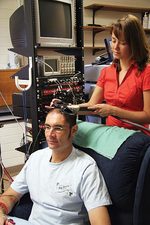Research keeps simple things in mind
 Physiology Physiology
Every day, millions of people around the world make a cup of tea or pick up a pen without giving a second thought to how it actually happens. But to victims of stroke, or Parkinson's, or other neurological disorders, these simple tasks can prove extremely challenging and even potentially hazardous. The impairment of the neurological pathway from brain to muscle has been the focus of Siobhan Schabrun's work for the past two years. Now part way through her PhD in the School of Molecular and Biomedical Science, Miss Schabrun's research could one day provide some vital clues into how our brain works. The ability to lift a cup or handle a pen using the appropriate amount of grip force comes second nature to most of us. The brain anticipates the correct amount of force required and is unfailingly accurate. But very little is known about which parts of the brain are involved in this internal process. This is where Miss Schabrun's research comes into play. "We know the brain is the most amazing part of the central nervous system, controlling our mental processes and physical actions," Miss Schabrun said. "But there is so much we don't know about how the brain works to carry out everyday tasks." The 24-year-old researcher spent two months at the Université Catholique de Louvain in Belgium last year to learn more about specific neuroscience techniques, new software and analysis programs. The trip was made possible after Miss Schabrun won the AUGU/RC Heddle Award in 2007, which enables the University's doctoral candidates to spend time in an overseas institution learning new methods. Miss Schabrun worked with Professor Etienne Olivier, a leading international neuroscience expert specialising in grip-lift tasks. His is one of the few laboratories in the world that conducts research into this area. "This was a fantastic experience, working with a research group which is using techniques we don't have access to here, learning new software to locate particular regions of the brain, and employing a different analysis program." Miss Schabrun is a qualified physiotherapist with an interest in neurological disorders and the rehabilitation processes. "As such, my PhD project focuses on the neurological mechanisms responsible for object manipulation, such as grasping and lifting a cup of tea. We need to gain a better understanding of these mechanisms so we can help people with neurological conditions who find it difficult to carry out everyday tasks where their hands are involved." Another aspect of Miss Schabrun's research has focused on a particular group of people - mainly writers and musicians - who suffer from a condition called focal dystonia, which affects the hands. Focal dystonia is a neurologically based disorder. People suffering from dystonia experience pain, cramping and relentless muscle spasms, preventing them from performing everyday tasks such as signing a cheque. It tends to affect people who use their hands over and again in a repetitive movement. "When you are learning to play tennis, your brain reorganises its structure to allow you to become more skilful in the game. In people with dystonia, as they learn, the brain seems to do too much reorganisation so that people have trouble performing normal movements." Miss Schabrun is due to submit her PhD in April 2009. Her supervisor is Dr Michael Ridding from the School of Molecular and Biomedical Science. Story by Candy Gibson
|





